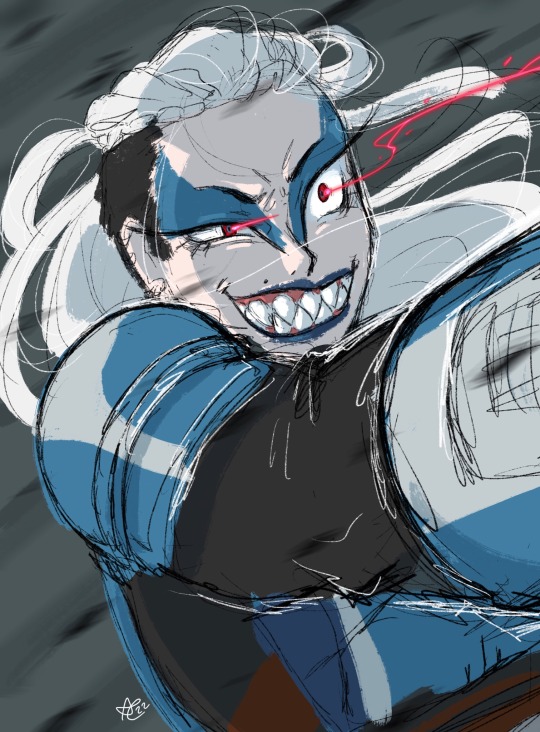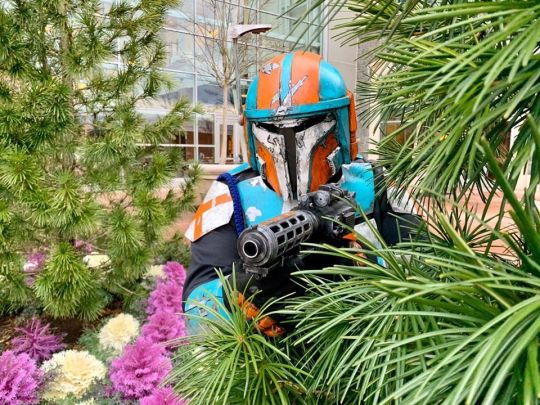#Senaar Ordo
Text

Sometimes you just need to draw your mando being feral
Older doodle I never posted trying to mess around with loosening up
17 notes
·
View notes
Photo

Jenga Can'gal of Kyrimorut Clan!
Photo by Senaar Ordo
Find Kyrimorut Clan:
MMCC Forums
Facebook
Instagram
40 notes
·
View notes
Note
Can I please request some mando'a endearments/nicknames?
Hey, I just wanna apologize for the delay to answering this !! And also, just as a forewarning, this list is nowhere near exhaustive, just bc of the sheer … flexibility of mando’a to accommodate personal needs. Since this question is also a little general, I’ll go into the more popular endearments, and then a few suggested constructions you can use.
Before I get started though, I just wanted to note that mando’a is funny as a language in that … many, many words can be used as affectionate terms, depending on who says what to who. So words that may have literal meanings (say, for example, night sky, or mountain, or sea) can also be used as terms of endearment, especially if ner, my, is placed in front.
Endearment is, often, more than just the terms we have at our disposal from a predefined list, and what may be used to express affection and endearment from one person might be offensive and insulting from another. It, like most things, depends on context and delivery.
Consider these words and how, in different contexts, they might be used to present affection, or as nicknames:
atin’la — tough
ca’tra — night sky
cerar — mountain
sarad — flower
Anyway, that said, I’m gonna start with the basics and further down we’ll move on to more complex terms. This is also cut for length.
Just the list to expect w/ explanations:
‘ika — diminutive suffix and its (appropriate) uses
burc’ya — friend
vod — sibling, companion, friend
cyar / cyar’ika — beloved
riduur — partner, spouse
kar’ta — heart
mesh’la — beautiful, handsome
meshurok — gemstone
riye — favor, good turn
runi — soul
sarad — flower
an’edee — all bite
n’edeemi — no bite
kair’ta — [my] desperate heart
Jango-specific endearments towards his clone sons (if you’re curious)
edit:: and there’s a follow-up post to further clarify
‘ika — diminutive suffix written as ‘ika - also added to a name as a very familiar or childhood form
The easiest terms of endearments is to tack on the suffix ‘ika to any name or part of a name, or word. It does not have to be only the first syllable of the name, either. It’s whatever rolls off the tongue easiest, or has the desired presentation.
Example: Ordo + ‘ika = Ord’ika.
The only caveat that should be noted is that this endearment, when attached to an actual name, is highly inappropriate to use in front of other people who are not “in” with the person(s). A father should not use this in conversation with his son when acquaintances are nearby. A parent should not use this to refer to their adult child in front of people whom that person has to command or lead, or just don’t know (or don’t know well).
And people under a person’s command, for this example people who look to Ordo to lead, should not ever use Ord’ika to refer to Ordo.
When writing mandalorians, you should try to avoid excessive, casual use of ‘ika tacked when there are only acquaintances around to overhear. ‘Ika, as popular of a diminutive as it is, is a term of affection that is most often used for children, and so to make casual use of ‘ika is to imply that one is not an adult.
This is a really, really common mistake across mandalorian fandom for whatever reason, but I would again just … urge you to, if you’re using ‘ika, to be mindful of who is present in the scene when [name]’ika is used.
Other (word, not name) example: Sen’ika — little bird
Which comes from senaar, bird, and ‘ika, little. And so on.
burc’ya — friend (can also be used ironically)
vod — sibling, friend, companion
Caveat: There is a significant difference between burc’ya and vod, and that is that no mandalorian would ever call someone who is not mandalorian their vod.
Someone can be close to your character without being of the same group of people, and the word for that friend is burc’ya. Mandalorians can also use this word ironically, or sarcastically, at friends who are and are not mandalorians.
It is … not appropriate, however, for mandalorians to call non-mandos vod. Vod literally means sibling, and carries the understanding that it’s addressing someone who is part of the culture, rather than someone without. If it’s ever used towards a non-mandalorian, even if it’s not intentional, it is an insult (or sarcastic, or a threat, depending on context).
However, both vod and burc’ya are appropriate to use in most situations.
(at least) two variations for vod:
vod’ika — little sibling
ori’vod — big/older sibling, special friend
‘ika as attached to a name is inappropriate for most occasions, vod’ika is slightly less inappropriate, but it still should be something kept to close / closed groups.
Ori’vod is different, in that in tacking on the ori in front, some small semblance of respect is implied.
Vod, in general, is probably the most malleable word of all of them, for the simple reason that with a little bit of cleverness, one can attach other words to vod to create different types of affectionate nicknames.
cyar(e) — beloved, loved / cyar’ika — darling, sweetheart
Another thing mandalorian fandom tends to forget is that cyar, or cyar’ika, is a general term, not one restricted to romantic relationships. One can use cyar / cyar’ika platonically, just as one can call someone beloved and not mean someone with whom they’re romantically entangled—though it is most often used to indicate “beloved” or “loved one,” so YMMV.
This is, however, acceptable to use in public (depending, of course, on your characters individual preferences and comfort for affection in public).
Further, cye / cya seems to hold an affectionate connotation in all its uses, but also translates vaguely to rolling (rolling with the punches, rolling waves, varied meanings that change upon context from literal to figurative). Thus, someone who has shown inner strength, or someone who’s shown to be able to adapt to anything, one might tack cye/cya with a name or word … but these are a little more complicated to work together, due to the … tenuous meaning that both cye / cya hold.
For example, take: cye’ruus — precious cinnamon roll. With the above for cye given, add onto ruus literally meaning rock, but colloquially is dependable / reliable / something of foundation (like how certain cultures have go-to elements to dishes that are absolutely fundamental), and thus together create a word that is not unlike the word Sheres, from shereshoy, but also means cinnamon roll.
riduur — partner, spouse, husband, wife
Now this word absolutely means exactly as it looks on the tin, so to speak. Riduur is one’s spouse, someone one is committed to in marriage—or the next closest equivalent to, if you don’t want to call it marriage.
kar’ta — heart
While it literally means heart, the word is derived from the deeply spiritual mando’a word for the stars, and as such can take on a poetic meaning to it. It’s appropriate to use as a term of endearment.
mesh’la — beautiful
meshurok — gem, gemstone
This is not restricted to women or women-presenting people, as mando’a does not recognize gender and therefore one can call anyone beautiful. The same goes for gemstone, too.
riye — favor, benefit, good turn
As when a series of bad luck finally ends and good luck returns, so is riye. But riye, also, can indicate that a person is the representation of that good turn, or that favor. Like a person who, upon meeting, changes lives for the better.
runi — soul (poetic only)
Runi is archaic and used mostly, only, in poetry and song. And, as such, can also then be used as a term of endearment as well. It is a very intense, strong, word, however, so keep that in mind.
sarad — flower
As with most words, be careful — not everyone would appreciate being called flower, and while some might find it acceptable or even flattering from one person, that same person might find it offensive from the mouth of another.
And now for some of the constructions I’ve touched on in the past:
an’edee — all teeth; all bite
n’edeemi — no bite
As I’ve touched on (and if you click through to the original posts, go into more detail), these two can be used as pair words as affectionate terms of abuse. What that means, really, is that they can be affectionate even as they are, gently, insulting—like calling someone a nerd in a tone that indicates you are simply joking with them.
An’edee can be shortened to An’ee, and N’edeemi can be shortened to N’edee. And, generally, they could be used as nicknames in and of themselves (An’ee being someone rough and often fight-y, and N’edee being someone more concerned with mediating and keeping the peace).
To be honest, these words were, originally, created for this express purpose.
kair’ta — [my] desperate heart
As touched on in the original post about kairkiyc, and from where this word is derived, it means loved one as intense as a heart pain, or a pang in one’s chest. It is the physical pain one might feel when feeling intense love (not necessarily romantic love and shouldn’t be used only for that).
I’ve used it most to refer to children, as a parent might love and care intensely for their child, but again … it can mean more than that, depending on who the term is for.
kair’ itself, as a prefix, may possibly be used as attached to another word to indicate a heart’s desperation, though the specific uses of it may be a little complicated and really should only be kept to words where kair’ would be replacing, say, kyr’ or ka(r)’, or some such word with the hard kahr / keer sounds.
vencuy — blessing, hope
This word comes from vencuyot, meaning future—or, more accurately, vencuyanir, to sustain, keep alive, preserve. Vencuy, or venku, when trimmed down, literally encompasses hope, as in a hope for the future, a promise of a future, a light in the dark, and all the apocryphal imagery associated with it.
I know that vercopaanir has “hope” attached to it, but it’s a different meaning of hope, as it’s associated with wish, and dream. Vercopa carries less certainty, implies more to dream than in something real, or in something physical, or grounded in reality. To us, that might be positive, but to mandalorians—whom stress a grounded pragmatism and practicality—something that is based in dreams is just not as positive to them as it sounds to us.
Jango Fett specific
If, for whatever reason, you wanted Jango to express affection towards one of the clone soldiers from him, Jango’s use of the word clone takes on a very, very different connotation than what other mandalorians would in using the same word—as, after all, the cloned men of the Grand Army of the Republic would, essentially be little echoes of himself.
eyayad(e) — [my] echo(es)
Coming from Jango Fett, specifically, it would sound oddly affectionate, even deeply sentimental.
To conclude, I hope this gave you a few ideas or was helpful ?? If you have more questions or would like more specific endearments, please let me know and I’ll get back to you asap. B’)
992 notes
·
View notes
Photo

Senaar Ordo, taking over a galaxy near you!
8 notes
·
View notes
Photo

Senaar Ordo everybody!
86 notes
·
View notes